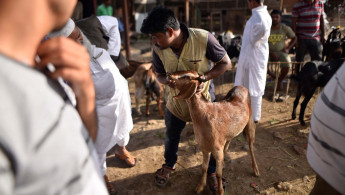One million people in Turkey 'at risk from coronavirus' during Eid al-Adha Muslim holiday
Coronavirus restrictions have already impacted the celebration of the Muslim holy month of Ramadan and the Eid al-Fitr holiday which comes at its close, with many restricted to their homes and forced to skip traditional communal prayers and meals.
But, with many Muslim-majority countries having eased restrictions in a bid to kick-start their economies, it remains to be seen how the coronavirus pandemic will impact the Eid al-Adha holiday, also known as Eid Qurban or the "Festival of the Sacrifice".
The holiday is traditionally marked with the sacrifice of an animal, which is then shared equally between one's own household, relatives, and the poor, in an act that honours Ibrahim's (Abraham) willingess to sacrifice his own son.
In Turkey, the animals are often sold in unsanitary livestock markets and slaughtered in unsanitary conditions, the head of the Chamber of Veterinary Surgeons of Istanbul said.
The marketplace conditions could act as a major vector for Covid-19 transmission, Murat Arslan told Daily Hurriyet.
Last year more than 3.5 million animals were slaughtered across Turkey for the holiday, which is considered the holiest in Islam.
Arslan has advised certain precaution be taken to minimise the spread of the coronavirus both within the market and outside.
 |
| Click to register now - webinar today! |
Face masks should be made mandatory and visitors should wear disposable plastic shoe coverings while in the market, he said.
Regular social distancing regulations should also be abided by, and the animals should be slaughtered at the marketplace rather than at home, Arslan added.
"Everybody wants to sacrifice their animal on the first day of the holiday. But we should expand this length to three days to stop overcrowding in these markets," he told Daily Hurriyet.
Tevfik Ozlu, a doctor in Turkey's health ministry, echoed Arslan's concerns.
Sellers should accept customers by appointment only and several members of the same family should not be allowed into a marketplace, he advised.
Similar concerns have been aired elsewhere in the Muslim world.
In Morocco, Minister of Agriculture Aziz Akhannouch warned in May that rural livestock markets could pose a danger during the holiday.
To prevent overcrowding, authorities in Pakistan are considering creating smaller livestock markets for the holiday which would be subject to stricter regulations.
Singapore has also banned the import of livestock for Eid Al-Adha, while Indonesia's ministry of agriculture has issued coronavirus regulations specific to the sale and slaughter of animals for the holiday.
Follow us on Facebook, Twitter and Instagram to stay connected





 Follow the Middle East's top stories in English at The New Arab on Google News
Follow the Middle East's top stories in English at The New Arab on Google News


